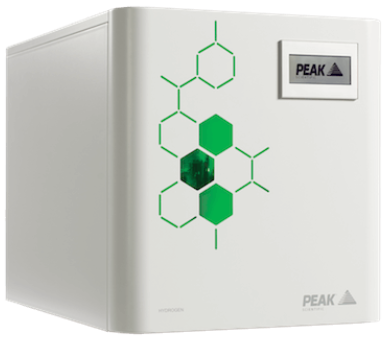Hydrogen cylinders are a potential safety risk in the laboratory
In December 2018 a hydrogen cylinder used at the prestigious Indian Institute of Science (IISc) exploded. The explosion killed an IISc researcher and injured 3 others.
This, unfortunately, is not the first laboratory explosion to be caused by the use of hydrogen gas cylinders. A quick internet search will show similar explosions which have been caused by hydrogen cylinders.
Due to the dangers they present, many laboratories around the globe are advised against, or prohibited from, using hydrogen gas cylinders. This can be problematic as hydrogen can be a key requirement for certain types of analysis. For example, hydrogen is often used as a carrier gas for Gas Chromatography.
This presents a safety issue for laboratories which require hydrogen for their analysis. There is, however, a solution which allows laboratories to use hydrogen without compromising safety. As hydrogen can be generated via electrolysis of water, a hydrogen gas generator can be used to supply hydrogen to laboratory instruments.

A Peak Scientific Precision Hydrogen Generator
Why is a hydrogen generator safer than hydrogen gas cylinders?
The LEL (Lower Explosive Level) of hydrogen is 4.1% in air. In an average-sized laboratory it would take around 2050 litres of hydrogen to reach this LEL. As hydrogen cylinders typically contain around 9000 litres of hydrogen, any leak or damage to the cylinder can cause the LEL to be reached within minutes, turning a laboratory into a highly explosive environment. This is extremely dangerous, particularly since hydrogen can spontaneously ignite.
A Peak Scientific hydrogen gas generator on the other hand only generates 500cc of hydrogen per minute. This means that it would take nearly 3 days for the LEL of hydrogen to be reached in the same average-sized laboratory, and such a slow leak building over 3 days to reach the LEL could only happen if the laboratory was hermetically sealed that is to say no windows open, all spaces below doors being sealed off. In other words it would take a very unlikely and specific set of circumstances for the LEL to be reached.
Ever reaching the LEL of hydrogen is extremely unlikely with a Peak Scientific hydrogen generator due to their in-built safety features:
• Internal leak check on start up
• External leak detection
• Pressure monitoring to prevent leaks and pressure build up
• Automatic cell shutdown at high pressure
• Audible/visual alarms
A gas generator will also eliminate the risk of injury which is presented to laboratory staff when they must move or change a heavy and cumbersome gas cylinder. Once a hydrogen gas generator has been installed it will supply hydrogen gas as your instrument demands it with simply the push of a button, there is no moving, changing or monitoring of heavy equipment required.
It is clear that hydrogen, if stored incorrectly, can be a significant risk to laboratory safety. For this reason it is inadvisable to use hydrogen cylinders in the lab since, as evidenced above, they are a potential risk to laboratory safety. However, laboratories need not avoid hydrogen use altogether. By generating hydrogen gas only as it is required, with a hydrogen gas generator, there is no need for it to be stored in dangerous quantities, eliminating the risk of explosion and making hydrogen a safe and viable option for laboratory analyses such as Gas Chromatography.
News articles about the hydrogen cylinder explosion at IISc
Blast in IISC lab kills researcher
Researcher killed in explosion at Indian Institute of Science
Similar incidents involving hydrogen cylinders
Hydrogen explosion in University Biochemistry Laboratory
Hydrogen cylinder fire in laboratory
Hydrogen gas leak from compressed gas cylinder
You may also be interested in:
